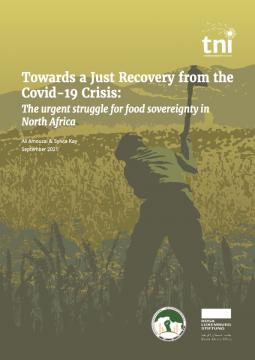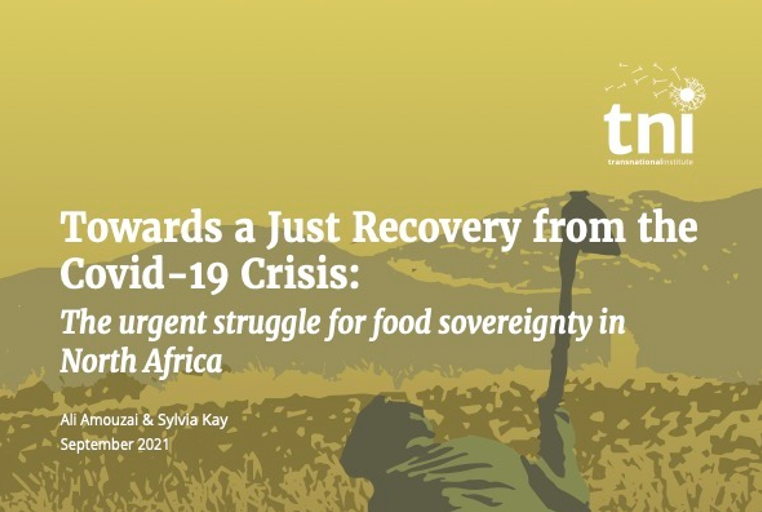 Towards a Just Recovery from the Covid-19 Crisis: The urgent struggle for food sovereignty in North Africa
Towards a Just Recovery from the Covid-19 Crisis: The urgent struggle for food sovereignty in North Africa
This report examines the intersections between Covid-19 and food systems across the North African region. It looks at how the dominant ‘food security’ paradigm increased vulnerability to the economic dislocation wrought by the pandemic. It examines the impacts of Covid-19, particularly on (rural) working people and small-scale food producers and how governments across the region responded to these challenges. Finally, it offers a pathway out of this moment of crisis rooted in models of food sovereignty and economic justice.
Download the full report here.
The end of 2019 and the beginning of 2020 saw the emergence of a new type of virus called coronavirus (SARS- CoV-2). Its high transmission rate and rapid spread around the world has led the World Health Organisation (WHO) to classify the COVID-19 disease it causes as a “global pandemic.
Covid-19 reached several countries in North Africa in mid- March 2020. On 23 March, a statement published by the Regional Secretariat of the North African Network for Food Sovereignty (NAFSN) raised the alarm about the pandemic, its economic repercussions, and how it would endanger public health and affect social conditions:
Millions of small farmers, agricultural workers, fisher folk and other small-scale food producers (the majority of which are women) who bear the burden of providing daily food to everyone else are forced to work during this pandemic. In order to ensure that food production continues, millions of them will be at risk of contracting the virus. It goes without saying that closing borders with Europe and reduced market access will have major social consequences (redundancies, unemployment, bankruptcy, indebtedness, etc.). It is evident that the risk of infection threatens poor agricultural workers and peasants, especially without taking the right measures to protect them and other workers who are driven to toil in intolerable conditions. Moreover, the majority of these working poor do not have the purchasing power to ward off the risk of the virus by purchasing the necessary medicines and food that they need.
As NAFSN highlighted the implications of the viral outbreak for the region, it also considered the crisis to be an opportunity to create an alternative to the current unjust and precarious systems we are living under.
This study, which builds on analysis carried out by NAFSN and others, examines the intersections between Covid-19 and food systems across the North African region. It looks at how the dominant ‘food security’ paradigm increased vulnerability to the economic dislocation wrought by the pandemic. It examines the impacts of Covid-19, particularly on (rural) working people and small-scale food producers and how governments across the region responded to these challenges. Finally, it offers a pathway out of this moment of crisis rooted in models of food sovereignty and economic justice.
Download:
Towards a Just Recovery from the Covid-19 Crisis: The urgent struggle for food sovereignty in North Africa(pdf, 9.35 MB)
Surmonter la crise de Covid-19 avec équité: Le combat pressant pour la souveraineté alimentaire en Afrique du Nord(pdf, 13.22 MB)





